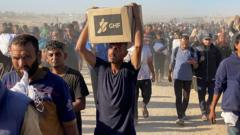Violence erupted at a newly established aid distribution center in Gaza, resulting in numerous civilian casualties as tensions escalate over Israel's alternative aid system, which now faces increasing criticism from international entities.
Tragedy Strikes at Gaza Aid Site Amid Shifting Distribution Strategies

Tragedy Strikes at Gaza Aid Site Amid Shifting Distribution Strategies
Israeli military actions have led to tragic civilian deaths at a new aid distribution center, prompting intensified scrutiny of the humanitarian framework in place.
Witnesses and medical teams on the ground have described horrifying scenes of violence as Israeli troops opened fire early Tuesday morning on Palestinians gathered at a newly established aid distribution center in southern Gaza. With reports of "total carnage" from foreign observers, the incident raises serious questions about Israel's ongoing humanitarian strategies.
According to an official statement from the Israeli military, the narrative differs sharply; it claims that "several suspects" approached Israeli forces "deviating from the designated access routes" and that troops resorted to warning shots and further fire directed at individuals who advanced toward them. The shooting of civilians, many of whom were seeking essential food aid, is likely to amplify the growing discontent surrounding the controversial new system for aid distribution in Gaza.
Initiated by Israel in collaboration with the United States, the new Gaza Humanitarian Foundation (GHF) aims to replace the previous aid operations conducted by the United Nations and experienced international organizations. Following a total ban on food and aid shipments into Gaza, Israel's switch to the GHF came amidst fears of widespread famine among the civilian population.
Israel alleges that personnel from the UN stood by while Hamas misappropriated the food aid, which the UN disputes, maintaining accountability for its distributions and refusing to cooperate with the GHF. Critically, the current GHF system has been marred by significant flaws, a sentiment echoed by humanitarian professionals following the resignation of GHF head Jake Wood, who stated that the organization cannot uphold the principles of "humanity, neutrality, impartiality, and independence."
The UN previously managed a robust network of aid distribution points, providing proper ingredients for communal kitchens and bakeries that catered to hundreds of thousands of people. In contrast, the new GHF system forces Palestinians to traverse a perilous war zone beneath the ruins of southern Gaza to collect their rations. The resulting distribution method has often escalated into chaos, exposing the most vulnerable families to a struggle for limited aid packages. Reports indicate that in their desperation, individuals have spent nights waiting to receive food, lost amidst the turmoil.
In light of these events, the UN High Commissioner for Human Rights, Volker Türk, expressed the dire implications of the GHF initiative, highlighting Israel's apparent disregard for the safety of civilians amidst their urgent need for food and medical supplies. He condemned Israel's actions as a blatant violation of the laws of war.
Proponents of the GHF argue that the initiative provides a vital lifeline, albeit limited, while opponents contend that it serves as a vehicle for Israel's control over Palestinian civilians. Statements from Israeli ministers openly declare that the provision of food aid serves as a strategic "lever" against Hamas.
As the turmoil surrounding the Gaza Humanitarian Foundation unfolds, Israel's close allies, including the UK, France, and Canada, are increasingly advocating for a shift in Israel's tactics, demanding the entry of essential humanitarian aid for over two million people. They have issued threats of potential sanctions and discussions regarding recognition of a Palestinian state if Israel continues its current military operations. International reactions grow increasingly concerned as Gaza's humanitarian crisis deepens, leading to greater isolation for Israel on the global stage.




















